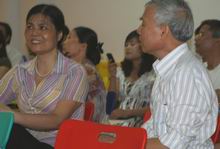The Materialism Antidote
Economics, power and culture operate in tandem. This is the level the risen Jesus addressed to the church  segments through John the Revelator.
segments through John the Revelator.
During His earthly ministry Jesus said that we would be in the world, but not of the world. This was a very Jewish statement. What Jesus was saying was that we, as societies of God’s people, would be cultures within other cultures.
Over the centuries, this has been the chief challenge for the descendants of Abraham, with the point of stumbling again and again being the desire to be like everyone else.
So it is today in the Western church. More than one renowned prophet has viewed the Church in America as being a prototype in need of the correction received by the first century Laodicean Church when John was on the Isle of Patmos: “You say you are rich, have become wealthy and have need of nothing. But I say to you that you are miserable, wretched, poor, blind and naked.”
This condition describes the dynamics underlying a materialistic society.
Yet, around the world today, especially in poor, emerging nations, the society, the culture represented by the Church in America is held in esteem as being the model of success, the model of how the church should operate in the 21st century.
Raising the Standard
The issue points to the standards for success that Jesus outlined to the seven primary church societies that had their beginnings in John the Revelator’s day. The issue relates to economics and money and the connection they have to power and culture.
The issue is one of balancing these factors – economics, culture and power. It is a role for which the Church serves as a forerunner in reshaping the standard around them. Among the most seductive of the societal-economic-power imbalances for success in the Church is materialism.
John D. Rockefeller, early in his career stated: “Make as much money as you can and give away as much money as you can.” Such thinking actually is very Jewish in its origins. Probably without realizing it, John D. had stumbled onto the antidote for materialism.
This antidote is incorporated in the Hebrew word tz’dakah, which best translated means righteous charity. It is the community dynamic, the responsibility of generosity, to help the less fortunate to stand on their own. Jewish tradition holds that the highest form of tz’dakah is to help someone start a business.
There are many who misinterpret the admonition to the Laodiceans as an indictment of wealth. It is not. Rather it addresses the spiritual condition of a society of believers who had become seduced in depending more on their wealth and success than on God.
 When in balance, economics, culture and power form the basis for the potential for the enduring qualities of society, which have translated into the momentum of the dominant civilizations of history. On the other hand, when these factors are misaligned and misused they digress into what historically have been the foundations of corruption, lawlessness and the spirit of poverty.
When in balance, economics, culture and power form the basis for the potential for the enduring qualities of society, which have translated into the momentum of the dominant civilizations of history. On the other hand, when these factors are misaligned and misused they digress into what historically have been the foundations of corruption, lawlessness and the spirit of poverty.
There’s an old adage: money rules. When that is so, then it challenges what Jesus warned about mammon.
Mammon is a powerful spirit that derives its substance from the love and quest for money. Having spent more than a quarter of a century working as a market consultant, I have had the privilege of serving scores of multinationals and a number of respected ministries.
In one of the most short-sighted moves I ever saw within a ministry group a general manager of a small to medium sized ministry got it in his head that his operation would improve if he employed the concept of profit centers.
This construct was employed in for-profit organizations 100 times the size of his to measure and control the diversity of their separate, individual companies. Nevertheless, this man’s brainstorm put form before function. It put money before key aspects of service, foundational to the purpose of this ministry.
First, prayer lines tied to their TV ministry were cut, because they did not meet his misguided profit center standard. Then their Bible school which attracted students from numerous countries around the world was closed. Money ruled and key parts of their function were myopically cut.
Even in the world, there is controversy over the wisdom of being numbers driven rather than customer or market driven.
If mammon cannot create an atmosphere in which money rules, then one of its subtleties is to engender the fear of money or its loss, which was the case in this example. It is the basis of the poverty spirit.
Nevertheless, even today, far too many view the antidote to poverty as the pursuit of money. Then together with a counterfeit illusion of success there is an erosion of the operation of the true power of God and an outlook that in short is the cart before the horse.
The truth in Deuteronomy 28:1 says that when we carefully follow the ways and instructions of the Lord, that the blessings would chase us down and overtake us. Money is the byproduct rather than goal.
The goal is the balance between culture, power and economics, with God’s priorities being exhibited in the way we address these vital issues.
God’s priorities have clearly been outlined in Scripture, both in the Old and New Covenants. When scripture makes reference to heeding the voice of the Lord, the admonition is for both the Truth, outlined in Scripture and the Spirit, revealed by the prophetic through mature leaders with hearts aligned with God’s priorities, whose admonitions in turn conform with the enduring, universal truths outlined by the Creator.
This is the foundation on which the balance resides. Yet, there is more.
The prophet Isaiah gave a major glimpse into God’s focus for His people being a culture that was distinctive, with the admonition of establishing opportunity for the poor and needy, for the widow and orphan. Isaiah’s perspectives were clearly outlined by Moses who wrote that we were not to take advantage of hired help, even those outside the camp of God’s people, because the Lord would hear their cry for justice. Moses gave priority to helping the underprivileged in their community-circle to get themselves established.
Moses wrote if there is a poor man among your brothers, do not be hard-hearted or tight-fisted toward your poor brother. Rather be open-handed and lend him what is needed. Give generously  without a grudging heart so the Lord could bless all the work of your hands.
without a grudging heart so the Lord could bless all the work of your hands.
Such instructions conform with the words of Jesus and His principles of the Kingdom of God. Jesus said give and it will be given unto you, good measure, pressed down, shaken together and running over, will it come back to you.
One of the observations for both the disproportionate success among diaspora Jews, as well as Jews in Israel’s business sector is the refined practice of mentoring and enabling the opportunity dimensions of tz’dakah. Tz’dakah generosity is the lynchpin principle that keeps the model, as well as materialism in right focus. Tz’dakah is fueled by balanced stewardship.
Foundation of Kingdom Stewardship
Tz’dakah is the foundation of stewardship that makes a difference. It is community-benefiting generosity on steroids. It enhances the culture-economic-power balance as it enables opportunity and builds community in a way that benefits all.
This God-designed stewardship has three chief components: generosity, managing and bringing increase.
It begins with the development of a discipline. Generosity is a key part of that discipline. Some mistakenly express the intention that when they get to a certain milestone in their quest for success, they will become generous givers.
However, such thinking is evidence of money ruling over them, rather than them ruling over their finances. Generosity begins in the heart. It is a priority and act of faith that faithfully starts small, even when things are tight.
One of the business leaders we have worked with in Vietnam owns a very successful construction firm. He tells of when he came to faith, he was so poor he couldn’t even afford a bicycle. But from his part-time work, he gave. It was sacrificial giving. He soon had a full-time job and he increased the proportion of his giving. He learned the tools of the business he was in and eventually started his own firm. Today, he helps many through his business and generosity.
 Generosity reflects the priority of being a vital part of a community you seek to build. It is a passion that hungrily seeks to be a part of the future of the community. It seeks no recognition, because God knows. Generous people consider God the source of their supply, which in reality, He is.
Generosity reflects the priority of being a vital part of a community you seek to build. It is a passion that hungrily seeks to be a part of the future of the community. It seeks no recognition, because God knows. Generous people consider God the source of their supply, which in reality, He is.
So when generosity forms the basis of the stewardship, then the second element of this God-type of stewardship, the management focus, takes on a dimension of the supernatural. Such efforts seek to serve with the wisdom that can only come from God. It is a leadership perspective that discerns the strategies and steps that will produce results.
Jesus had a lot to say about stewardship. He made it clear that good stewards operate with diligence. They are prepared and constantly preparing, which translates into the way they organize things. They are prudent and carefully consider the alternatives and steps. Such prudence avoids major missteps and releases creativity. Jesus even chided his followers that sometimes the people of the world can be more insightful in applying their strategies than the people of God.
In that regard, they are shrewd-thinking risk takers while God’s people sometimes can be too cautious and even fearful. Yet with God, this type of faith does not involve recklessness, but trust in God, as God’s stewards carefully consider the steps God would have them take. They operate faithfully under the authority of those they serve. Serving is central to this process. Jesus said serving forms the basis of Kingdom leadership. The result brings increase.
Bringing increase, along with creativity, is God’s nature. Good management, that is righteous management, will bring increase. Jesus taught about the parable of the talents. It was the servant who brought the most increase who received not only the commendation of his master, but promotion and additional assets with which to work. Yet, in this process tz’dakah is the trigger. Generosity is the grease that opens the gates to opportunity.
The Stewardship of Community-Building
The issue for effective community-building is establishing a culture in which God rules. Central to this goal is restoring God to the marketplace. Community-building must be proactive in Kingdom culture. A Kingdom culture provides the gateway in which the natural world and the supernatural can intersect. With God at the center, it is where the exponential factor, the multiplication that only can be explained by God, kicks in.
Community-building enables opportunity for others and reaches for the common good. It is the big picture type of outlook that sees the impact of current trends on future opportunity simultaneously for enterprises, the community and the society around it. It is the measure noted by Isaiah in repairing the breach and rebuilding the foundations designed to benefit the underprivileged and community as a whole.
We have entered a day in which great creativity and innovation are being reflected in the agendas coming from God’s genuinely-called marketplace ambassadors. Yet, we cannot be unaware of the evil one’s devices, especially materialism. Aside from the measure of the overriding impact of serving the community, the litmus test and the antidote resides in evidence of generosity.
In the sight of God, you can be sure that the stingy entrepreneurs are doing their own thing, rather than God’s. On the other hand, a track record of helping the less fortunate establish their own businesses will result in increased opportunity that incorporates trickle-down blessing to all.
Discerning the Challenge
The subtlety of subtleties is in discerning the realities of the challenge. From the beginning the reality has been the enticement of the counterfeit. In the Garden of Eden, at the flood, the Tower of Babel and all during the history of the descendants of Abraham, the forces of darkness have manifested in what the prophet Jeremiah referred to as Babylon and Chaldea. Babylon and Chaldea represent the age-old alliance between the world’s system and sorcery. This is where materialism resides. This is the hidden alliance of lawlessness, corruption and poverty poised to undermine the path of the righteous.
The snares have been heart issues, evil enticements influenced by the lust for power, unrighteous gain and corrupt influence. Each are factors impacting power, economics and culture. At the crux  is the misuse of ambition, which ties into the subtle snare of materialism. As with other forms of spiritual counterfeits, it will carry the identifying marks of deceit, guile and dishonor.
is the misuse of ambition, which ties into the subtle snare of materialism. As with other forms of spiritual counterfeits, it will carry the identifying marks of deceit, guile and dishonor.
Ambition is tied to power. The central message of Jesus’ earthly ministry was focused on how to apply righteous power in a corrupt world. This is the way of the Kingdom. Its employment is radical. Jesus Himself said the gate was narrow and the way hard. It is much more than superficial religious games. It is the righteous way of life, a paradox to the world’s way, that employs righteous power to impact society and culture and economic matters. Its use will stir things up.
Ambition can either operate and create a climate of honor and trust or it will make its way by guile and deceit. Research by the renowned social economist Frances Fukuyama has determined that high trust societies have a much greater potential for prosperity than low-trust societies. The difference is determined by a combination of the controlling spirit and a different way of thinking.
Applications for Righteous Culture-Power-Economics
Tz’dakah and Kingdom stewardship are foundational and require this different way of thinking. Applying this different way of thinking has a solid bedrock of honor and trust. Such thinking produces a different way of operating as a people. Operating as a people in this way is not possible without God.
When in balance, culture, power and economics form God’s economy. In God’s economy self-sufficiency within the community is vital. It is a part of being a culture within a culture. Over the centuries, the Jewish people have been ahead of the power curve in matters of business, finance and brokering. In societies comprised primarily of a nobility and peasants, they have served in roles that have established a middle class. When those around them began rising to roles in this middle class, typically persecution would follow. What has resulted is the wisdom of operating self-sufficiently, as a culture within a culture.
However, this hasn’t happened by chance. There’s a playbook that has been proactively passed on from generation to generation, as the community gives first priority to strengthen itself for the future.
The Jewish community has always proactively invested in the emerging generation and the generations to come. In current terms, it has involved a focus on mentoring. One of the key components being attributed to the rise of the high-tech boom in Israel is a variant of one generation passing on the tools of the trade to the next generation. It is a peer-teaches-peer model in which younger adults teach teens and teens teach grade school children, about the practicalities of life. It has been one of the unique strategies of passing on and enhancing the enduring secrets to their culture.
The minyan strategy likewise is the most basic form of how the Jewish community is designed to operate. It combines the spiritual and business. It is based on the premise that whenever ten Jews lives within walking distance of one another, they form a regular gathering known as a minyan. This gathering serves two primary purposes: first to pray and seek God and second to help each other become successful in business.
In our God’s economy program, these minyans are led by spiritually mature business owners, with between five to fifteen members. These support groups help its members to grow spiritually, provide a mini-business incubator that fosters success in new startups and existing businesses, and provides the means to hold each other accountable in their individual roles in serving the community.
Another practice that strengthens the culture is the rite of passage into adulthood that is such a key part of Jewish heritage. The demarcation into adulthood is accompanied by responsibility. That also explains why the army service in Israel produces responsible, mature adults whose perspective reflects the importance of the community and society around them, giving clarity to their responsibility in its future development.
Each of these applications hold the potential of imparting the secrets of the culture, of holding each other accountable and of inoculating its members against the subtleties of materialism. It underscores the standard of the culture for excellence and the quality of being proactive doers and contributors to the community, rather than passive talkers and takers. It represents the essence of being game-changers and a society of leaders, with God at the helm.
 Within the wisdom of being a culture within a culture is the strategy of strategic alliances. These are God-ordained, strategic-level, holy alliances. Joseph’s alliance with Pharaoh is a prime example. Alliances such as this are defined by the openness of the Pharaohs to the prophetic word of God and to God’s people. Its basis rests on trust. The expectation for the days upon us are for many such alliances, that in the swirl of turbulence around us, will keep God’s people safe and also be a safe-haven for those with whom the alliances are operating.
Within the wisdom of being a culture within a culture is the strategy of strategic alliances. These are God-ordained, strategic-level, holy alliances. Joseph’s alliance with Pharaoh is a prime example. Alliances such as this are defined by the openness of the Pharaohs to the prophetic word of God and to God’s people. Its basis rests on trust. The expectation for the days upon us are for many such alliances, that in the swirl of turbulence around us, will keep God’s people safe and also be a safe-haven for those with whom the alliances are operating.
From the beginning, God’s people have had the responsibility for being the catalysts and forerunners for establishing the alignment between culture, power and economics with the right priorities. The proactive application of tz’dakah generosity is the antidote to this most devilish strategy of materialism.
To the Laodiceans, the admonition was given to buy gold refined in the fire, discerning the riches that endure, benefiting not themselves but the community and future generations. The word the Laoiceans received also made it clear that they were to acquire “white garments,” that their nakedness not be exposed. Again and again in the word of God, such white garments reference the anointing or aura of the presence of God abiding with them. Adam and Eve lost this aura at the fall and their nakedness was exposed. Finally, the Laodiceans were told to buy eye salve, to anoint their eyes that they might see. The ability to see beyond the natural, into the hidden realm of the supernatural is critical to the mantle of being a culture of God’s people.
From the days of Moses, God’s people have been told that the blessings would come upon them and overtake them when they carefully heeded and obeyed the voice of the Lord. In today’s turbulent world, there are emerging pockets of Light, demonstrators of the reality of God through a people. The world is looking. The world is looking for that reality being demonstrated through a people.
The model for the application of these pockets of Light is the enduring model started by Abraham, elaborated on in the Torah by Moses, demonstrated and built into a Kingdom by David and then had the bar raised with the principles of the Kingdom by Jesus. Indeed, the Kingdom of God is at hand, with the empowerment available to those who will yield ALL with the restoration of all that resides in the path ahead.
___________________________________________________
Morris Ruddick has been a forerunner and spokesman for the higher dimensions of business leadership since the mid-90s. As founder of Global Initiatives Foundation and designer of the God’s Economy Entrepreneurial Equippers Program, Mr. Ruddick imparts hope and equips economic community builders to be blessed to be a blessing where God’s light is dim in diverse regions around the globe.
He is author of “The Joseph-Daniel Calling;” “Gods Economy, Israel and the Nations;” “The Heart of a King;” “Something More;” “Righteous Power in a Corrupt World;” “Leadership by Anointing;” and “Mantle of Fire,” which address the mobilization of business and governmental leaders with destinies to impact their communities. They are available in print and e-versions from www.Amazon.com, www.apple.com/ibooks and www.BarnesandNoble.com.
His videos on Jewish Business Secrets can be found at www.strategic-initiatives.org.
Global Initiatives Foundation (www.strategic-initiatives.org) is a tax-exempt 501 (c) 3 non-profit whose efforts are enabled by the generosity of a remnant of faithful friends and contributors whose vision aligns with God’s heart to mobilize economic community builders imparting influence and the blessings of God. Checks on US banks should be made out to Global Initiatives and mailed to PO Box 370291, Denver CO 80237 or by credit card at http://strategicintercession.org/support/
Likewise, email us to schedule a seminar for your group’s gathering on the Joseph-Daniel Calling or on anointing the creative in business.
2017 Copyright Morris Ruddick — info@strategic-initiatives.org
Reproduction is prohibited unless permission is given by a SIGN advisor. Since early 1996, the Strategic Intercession Global Network (SIGN) has mobilized prophetic intercessors and leaders committed to targeting strategic-level issues impacting the Body on a global basis. For previous posts or more information on SIGN, check: http://www.strategicintercession.org

